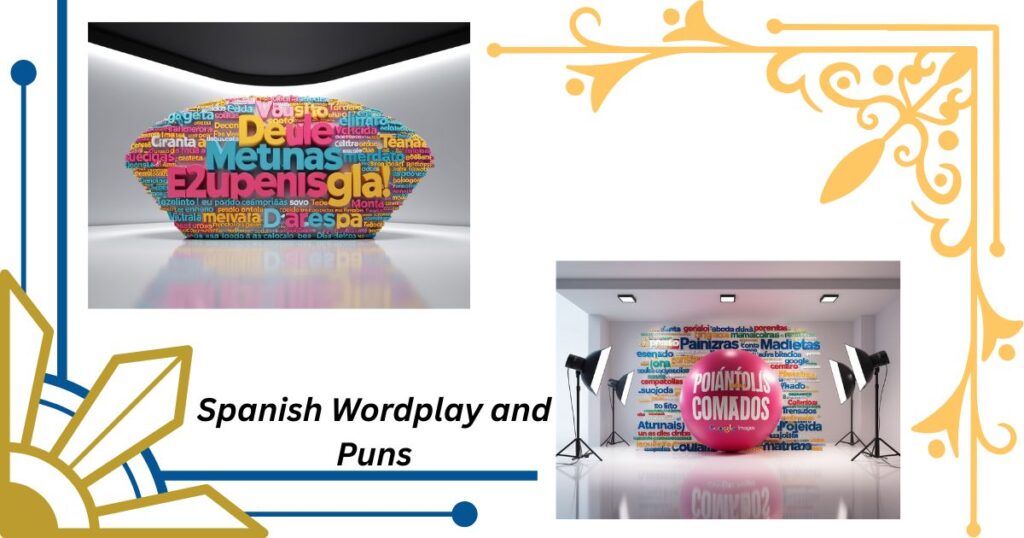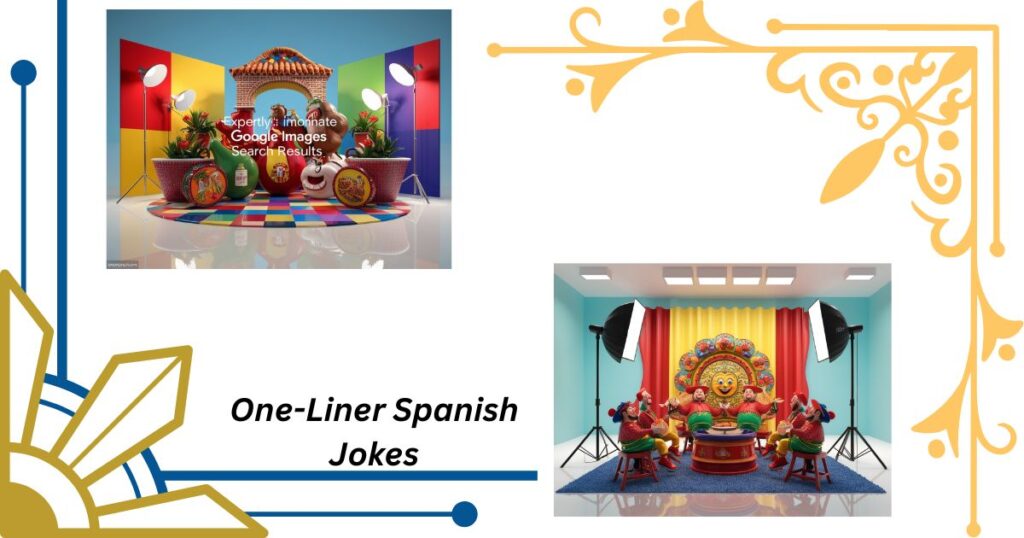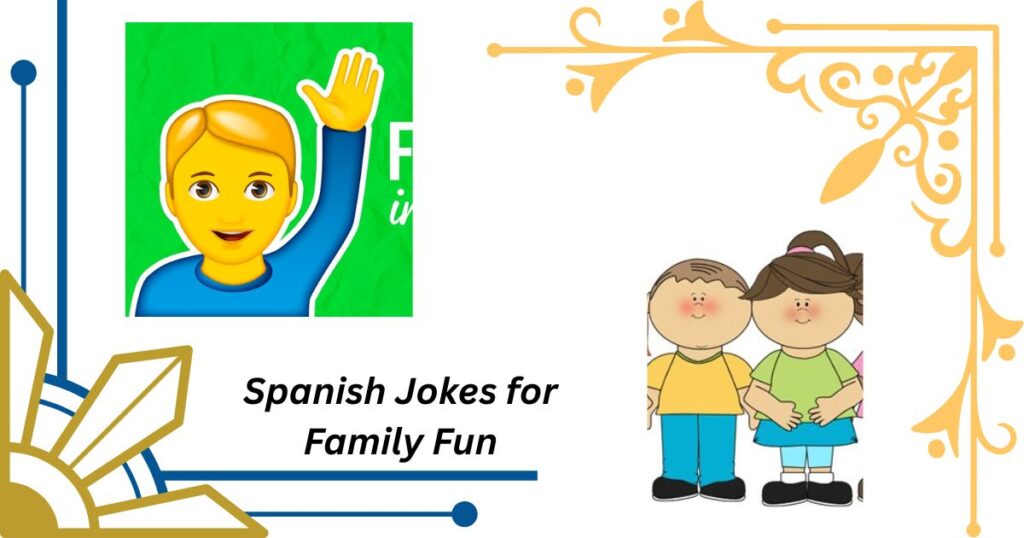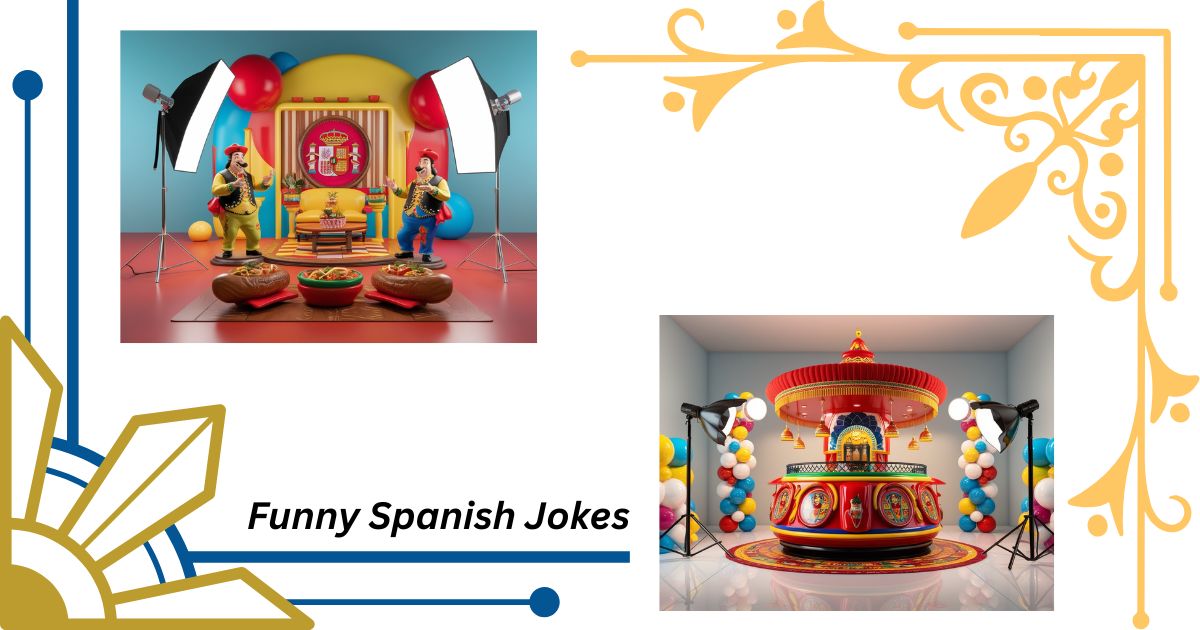Laughter knows no language. But Spanish jokes? They hit extra different! Whether it’s the rhythm, the wordplay, or the wild expressions, Spanish humor brings something special to every punchline.
This list of 40 funny Spanish jokes will not only make you laugh out loud, but also teach you a little about language and culture. Get ready for a hilarious ride!
How Humor Translates in Spanish Culture
- Spanish humor is full of irony, exaggeration, and sarcasm.
- Many jokes come from everyday life and family.
- People love jokes about school, parents, and food!
- Double meanings and slang are common.
- There’s often a twist at the end of jokes.
- Humor is used to break tension or show affection.
- Jokes about mothers (“mamá chistes”) are popular.
- Wordplay is everything in Spanish puns.
- Some jokes come from old Spanish sayings.
- Humor is often clean, playful, or goofy.
- Some dad jokes in Spanish are painfully good!
- People often laugh with big sounds: “jajaja!”
- Humor in Spain vs. Latin America can differ.
- Funny stories (“chistes largos”) are common.
- Spanish stand-up comedy is growing fast!
Tips for Understanding Spanish Wordplay and Puns

- Look for double meanings.
- Learn common Spanish phrases with humor.
- Some words sound alike but mean different things.
- Gendered words can be used for jokes.
- Jokes play with verb forms.
- Many puns use common Spanish nouns.
- Try to listen to how the joke sounds aloud.
- Use a dictionary for weird or slang words.
- Practice with Spanish joke translations.
- Ask native speakers what a joke means.
- Some jokes only work when said out loud.
- Don’t take jokes too seriously!
- Start with easy Spanish jokes.
- Try repeating the jokes to learn vocab.
- Watch Spanish comedy skits to learn tone.
Top 10 Classic Spanish Jokes Everyone Loves
- ¿Por qué los libros de matemáticas están tristes? Porque tienen muchos problemas.
- ¿Qué le dijo una uva a otra? Nada, solo se aplastó.
- ¿Por qué el tomate se sonrojó? Porque vio la ensalada desnuda.
- Mamá, en la escuela me llaman distraído. Juanito, tú vives en la casa de enfrente.
- ¿Cuál es el colmo de Aladdín? Tener mal genio.
- Camarero, ese filete tiene muchos nervios. Pues normal, es la primera vez que se lo comen.
- ¿Por qué las focas miran siempre hacia arriba? ¡Porque ahí están los focos!
- Estaba tan delgado que en lugar de sombra, tenía una línea.
- ¡Estoy leyendo un libro sobre antigravedad! Es imposible dejarlo.
- Doctor, tengo complejo de feo. No, lo que tiene es cara de realidad.
- ¿Cuál es el colmo de un jardinero? Que siempre lo dejen plantado.
- ¡Oye, tu perro está ladrando! Pues dile que no soy su amigo.
- ¡Tengo hambre! Hola hambre, soy papá.
- ¡No puedo respirar! Pues deja de leer chistes malos.
- ¡Te invito a salir… de mi vida!
10 Hilarious One-Liner Spanish Jokes (Short and Snappy!)

- Soy tan lento que cuando corro, retrocedo.
- Estudiar es mi pasatiempo favorito… en otro universo.
- Mi memoria es tan buena que… ¡olvidé lo que iba a decir!
- Estoy en forma. Redonda también es forma.
- El dinero no da la felicidad, pero compra tacos.
- Me caes bien… lejos.
- Tengo muchas cualidades, pero se me olvidaron.
- No soy flojo, ahorro energía.
- Soy multitarea: puedo hacer nada y pensar a la vez.
- Me gusta dormir para no gastar comida.
- Amo los lunes… dijo nadie nunca.
- Soy experto en perder tiempo.
- Trabajo bajo presión… de mi mamá.
- Vivo al límite: dejo todo para mañana.
- Fui al gimnasio… a buscar WiFi.
10 Funny Spanish Jokes with English Translations
- ¿Por qué no juegas al escondite con las montañas? Porque siempre te encuentran.
(Why don’t you play hide-and-seek with mountains? They always peak.) - ¿Cuál es el animal más antiguo? La cebra, porque está en blanco y negro.
(What’s the oldest animal? The zebra — it’s in black and white!) - Estoy leyendo un libro sobre gravedad. ¡Es imposible dejarlo!
(I’m reading a book about gravity. It’s impossible to put down!) - Mamá, en la escuela me llaman distraído. Juanito, tú vives aquí al lado.
(Mom, they call me distracted at school. Juanito, we don’t go to that school!) - ¡No me hables! Soy un fantasma.
(Don’t talk to me! I’m a ghost.) - Doctor, veo cosas. Pues cierre los ojos.
(Doctor, I see things. Then close your eyes.) - ¿Por qué el sol nunca fue a la escuela? Porque ya era brillante.
(Why didn’t the sun go to school? It was already bright.) - ¡Te invito a salir! Pero de mi vida.
(I invite you out! Out of my life.) - El pasado, presente y futuro entraron a un bar. Fue tenso.
(Past, present, and future walked into a bar. It was tense.) - No soy raro, soy edición limitada.
(I’m not weird, I’m a limited edition!) - ¡Tienes cara de lunes!
(You have a Monday face!) - Estoy en modo ahorro: no me muevo.
(I’m on saving mode: I don’t move.) - ¡Cállate que me desconcentras de no hacer nada!
(Quiet! You’re distracting me from doing nothing!) - El café y yo: una historia de amor y ansiedad.
(Coffee and I: a love and anxiety story.) - No soy perezoso. Estoy en pausa.
(I’m not lazy. I’m on pause.)
10 Kid-Friendly Spanish Jokes for Family Fun

- ¡Toc, toc! ¿Quién es? El gato. ¡El gato qué? El gato-rradeando.
- ¿Por qué los peces no van a la escuela? Porque ya tienen muchas escamas.
- ¡Soy una papa feliz! Porque tengo salsa.
- ¡Hola! Soy un plátano… ¡y me estoy pelando de risa!
- ¿Cuál es el colmo de un lobo? Tener miedo del cuento.
- ¡Cuidado con la silla! ¡Sienta mal!
- Mamá, en la escuela me dicen dinosaurio. Tranquilo, T-Rex.
- ¡Toc, toc! ¿Quién es? Abeja. Abeja qué? Abeja-tu puerta.
- ¡Tengo una peluca nueva! No se nota porque soy calvo.
- ¡Toc, toc! ¿Quién es? Pan. Pan qué? Pan-tasma.
- ¡Papá, hay un monstruo debajo de la cama! Dile que se corra, que también voy.
- ¡Soy una nube feliz! Porque me siento elevada.
- ¡No soy un robot! Solo no quiero hacer tarea.
- ¡Mi perro habla! Pero solo cuando no lo miran.
- ¡Tengo miedo! Pues canta y te espantas solo.
Laughing and Learning: How Spanish Jokes Help Language Learners
- Improve your vocabulary naturally.
- Learn funny Spanish phrases with context.
- Get used to slang and idioms.
- Hear how native speakers talk.
- Practice Spanish joke translation skills.
- Jokes make language fun, not boring.
- Understand cultural habits through humor.
- Short jokes are easy to memorize.
- Builds confidence in speaking.
- You’ll never forget a joke!
- Teaches verb tenses in real use.
- Jokes often repeat useful grammar.
- Learn witty Spanish humor easily.
- Explore Latin humor differences.
- Laugh and learn at the same time!
Popular Spanish Slang That Makes Jokes Even Funnier

- “Estás frito” – You’re in trouble.
- “Echar relajo” – To joke around.
- “No manches” – No way!
- “Ser la leche” – To be awesome.
- “Vale madre” – Doesn’t matter at all.
- “Chido” – Cool.
- “Guay” – Awesome (Spain).
- “Tía/tío” – Dude/girl.
- “Pilas” – Be sharp/alert.
- “Majo/a” – Nice person.
- “Está de pelos” – Super cool.
- “Bromear” – To joke.
- “Desmadre” – Total mess (funny chaos).
- “Buena onda” – Good vibes.
- “Estar loco” – To be nuts (funny).
Conclusion: Laugh, Learn, and Share the Joy
Spanish jokes aren’t just funny — they’re full of life, laughter, and learning. From silly one-liners to cultural wordplay, they offer a joyful way to enjoy the Spanish language. So, keep smiling, keep sharing, and let the good vibes roll in every “jajaja” you say!
FAQs
How do you write the sound of a laugh?
You can write it as “haha,” “lol,” or in Spanish: “jajaja.”
What language uses kkkk to laugh?
Portuguese speakers, especially Brazilians, use “kkkkk” to show laughter.
Why do Spanish laugh jajaja?
In Spanish, the letter “j” sounds like the English “h,” so “jajaja” sounds like “hahaha.”
What is the yo form of laugh in Spanish?
The “yo” form of laugh in Spanish is “río.”











